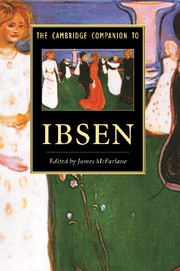Book contents
- Frontmatter
- 1 Ibsen's dramatic apprenticeship
- 2 Ibsen and historical drama
- 3 Dramatic and non-dramatic poetry
- 4 Ibsen and comedy
- 5 Ibsen and the realistic problem drama
- 6 Ibsen and feminism
- 7 The middle plays
- 8 The last plays
- 9 Ibsen's working methods
- 10 Ibsen and the theatre 1877-1900
- 11 Ibsen and the twentieth-century stage
- 12 Ibsen on film and television
- 13 On staging Ibsen
- 14 Ibsen and the drama of today
- 15 A century of Ibsen criticism
- 16 Works of reference
- Index
14 - Ibsen and the drama of today
Published online by Cambridge University Press: 28 May 2006
- Frontmatter
- 1 Ibsen's dramatic apprenticeship
- 2 Ibsen and historical drama
- 3 Dramatic and non-dramatic poetry
- 4 Ibsen and comedy
- 5 Ibsen and the realistic problem drama
- 6 Ibsen and feminism
- 7 The middle plays
- 8 The last plays
- 9 Ibsen's working methods
- 10 Ibsen and the theatre 1877-1900
- 11 Ibsen and the twentieth-century stage
- 12 Ibsen on film and television
- 13 On staging Ibsen
- 14 Ibsen and the drama of today
- 15 A century of Ibsen criticism
- 16 Works of reference
- Index
Summary
In his Introduction to the 1957 edition of his Collected Plays, Arthur Miller singled out certain aspects of Ibsen's work for comment:
There is one element in Ibsen's method which I do not think ought to be overlooked, let alone dismissed as it so often is nowadays. If his plays, and his method, do nothing else they reveal the evolutionary quality of life. One is constantly aware, in watching his plays, of process, change, development. I think too many modern plays assume, so to speak, that their duty is merely to show the present countenance rather than to account for what happens. It is therefore wrong to imagine that because his first and sometimes his second acts devote so much time to a studied revelation of antecedent material, his view is static compared to our own. In truth, it is profoundly dynamic, for that enormous past was always heavily documented to the end that the present be comprehended with wholeness, as a moment in a flow of time, and not — as with so many modern plays — as a situation without roots. Indeed, even though I can myself reject other aspects of his work, it nevertheless presents barely and unadorned what I believe is the biggest single dramatic problem, namely, how to dramatize what has gone before. I say this not merely out of technical interest, but because dramatic characters, and the drama itself, can never hope to attain a maximum degree of consciousness unless they contain a viable unveiling of the contrast between past and present, and an awareness of the process by which the present has become what it is. And I say this, finally, because I take it as a truth that the end of drama is the creation of a higher consciousness and not merely a subjective attack upon the audience's nerves and feelings. What is precious in the Ibsen method is its insistence upon valid causation, and this cannot be dismissed as a wooden notion.
- Type
- Chapter
- Information
- The Cambridge Companion to Ibsen , pp. 227 - 232Publisher: Cambridge University PressPrint publication year: 1994
- 4
- Cited by



